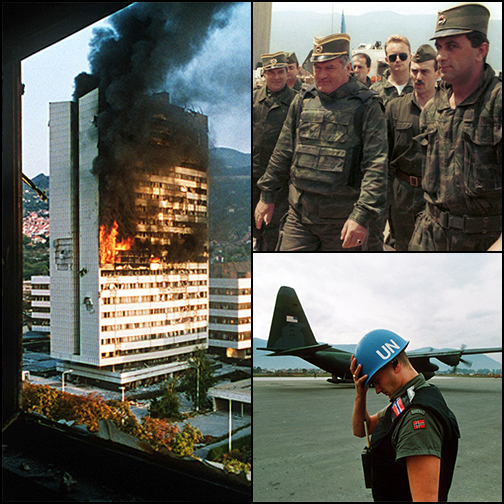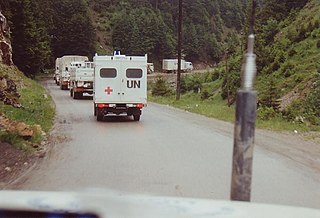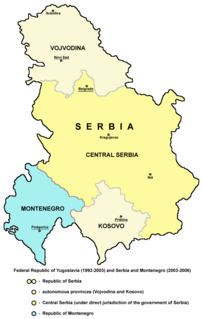| UN Security Council Resolution 827 | |
|---|---|
International Criminal Tribunal for the former Yugoslavia | |
| Date | 25 May 1993 |
| Meeting no. | 3,217 |
| Code | S/RES/827 (Document) |
| Subject | Tribunal (Former Yugoslavia) |
Voting summary | 15 voted for None voted against None abstained |
| Result | Adopted |
| Security Council composition | |
Permanent members | |
Non-permanent members | |
United Nations Security Council resolution 827, adopted unanimously on 25 May 1993, after reaffirming Resolution 713 (1991) and all subsequent resolutions on the topic of the former Yugoslavia, approved report S/25704 of Secretary-General Boutros Boutros-Ghali, with the Statute of the International Tribunal as an annex, establishing the International Criminal Tribunal for the former Yugoslavia (ICTY). [1]

United Nations Security Council resolution 713, adopted unanimously on 25 September 1991, after receiving representations from a number of Member States and commending the efforts of the European Community in the region, the Council decided to impose, under Chapter VII, an arms embargo on the Socialist Federal Republic of Yugoslavia, in light of the outbreak of fighting in the country. Resolution 713 was the first resolution that concerned the breakup of Yugoslavia.

Boutros Boutros-Ghali was an Egyptian politician and diplomat who was the sixth Secretary-General of the United Nations (UN) from January 1992 to December 1996. An academic and former Vice Foreign Minister of Egypt, Boutros-Ghali oversaw the UN at a time when it dealt with several world crises, including the breakup of Yugoslavia and the Rwandan genocide. He was then the first Secretary-General of the Organisation internationale de la Francophonie from 16 November 1997 to 31 December 2002.

The International Tribunal for the Prosecution of Persons Responsible for Serious Violations of International Humanitarian Law Committed in the Territory of the Former Yugoslavia since 1991, more commonly referred to as the International Criminal Tribunal for the former Yugoslavia (ICTY), was a body of the United Nations established to prosecute serious crimes committed during the Yugoslav Wars, and to try their perpetrators. The tribunal was an ad hoc court located in The Hague, Netherlands.
Contents
Still alarmed at violations of international humanitarian law in former Yugoslavia and especially in Bosnia and Herzegovina, including mass killings, systematic detention and rape of women and ethnic cleansing, the resolution determined that the situation continued to pose a threat to international peace and security, further announcing its intention to bring an end to such crimes and bring justice to the victims. [2] The Council decided that the establishment of a tribunal and the prosecution of persons responsible would address such violations, reaffirming its decision in Resolution 808 (1993).
International humanitarian law (IHL) is the law that regulates the conduct of war. It is that branch of international law which seeks to limit the effects of armed conflict by protecting persons who are not participating in hostilities, and by restricting and regulating the means and methods of warfare available to combatants.

Bosnia and Herzegovina, sometimes called Bosnia–Herzegovina, and often known informally as Bosnia, is a country in Southeastern Europe, located within the Balkan Peninsula. Sarajevo is the capital and largest city.

Detention is the process whereby a state or private citizen lawfully holds a person by removing his or her freedom or liberty at that time. This can be due to (pending) criminal charges preferred against the individual pursuant to a prosecution or to protect a person or property. Being detained does not always result in being taken to a particular area, either for interrogation or as punishment for a crime.
Acting under Chapter VII of the United Nations Charter, the Council established the International Criminal Tribunal for the former Yugoslavia for crimes committed in the territory of the former Yugoslavia between 1 January 1991 and a date to be determined by the Council upon the restoration of peace in the region. Until the appointment of a Prosecutor, evidence would continue to be gathered by the Commission of Experts established in Resolution 780 (1992).
Chapter VII of the United Nations Charter sets out the UN Security Council's powers to maintain peace. It allows the Council to "determine the existence of any threat to the peace, breach of the peace, or act of aggression" and to take military and nonmilitary action to "restore international peace and security".

A prosecutor is a legal representative of the prosecution in countries with either the common law adversarial system, or the civil law inquisitorial system. The prosecution is the legal party responsible for presenting the case in a criminal trial against an individual accused of breaking the law. Typically, the prosecutor represents the government in the case brought against the accused person.

United Nations Security Council resolution 780, adopted unanimously on 6 October 1992, after reaffirming Resolution 713 (1991) and subsequent resolutions on the topic, the Council expressed its concern at the continued "widespread violations of international humanitarian law" in Bosnia and Herzegovina and authorised the Secretary-General Boutros Boutros-Ghali to establish a Commission of Experts to examine and analyse the information submitted pursuant to Resolution 771 (1992) on violations of the Geneva Conventions in the region.
The Council then requested the Secretary-General to submit suggestions received from countries regarding the rules of procedure and evidence called for in Article 15 of the Statute of the International Tribunal to judges at the tribunal. It also decided that all Member States would co-operate with the ICTY and its organs in accordance with the Statute of the International Tribunal. At the same time, contributions from states, intergovernmental and non-governmental organisations to the Tribunal was urged.
An intergovernmental organization or international governmental organisation (IGO) is an organization composed primarily of sovereign states, or of other intergovernmental organizations. Intergovernmental organizations are called international organizations, although that term may also include international non-governmental organization such as international nonprofit organizations or multinational corporations.

Non-governmental organizations, nongovernmental organizations, or nongovernment organizations, commonly referred to as NGOs, are usually non-profit and sometimes international organizations independent of governments and international governmental organizations that are active in humanitarian, educational, health care, public policy, social, human rights, environmental, and other areas to effect changes according to their objectives. They are thus a subgroup of all organizations founded by citizens, which include clubs and other associations that provide services, benefits, and premises only to members. Sometimes the term is used as a synonym of "civil society organization" to refer to any association founded by citizens, but this is not how the term is normally used in the media or everyday language, as recorded by major dictionaries. The explanation of the term by NGO.org is ambivalent. It first says an NGO is any non-profit, voluntary citizens' group which is organized on a local, national or international level, but then goes on to restrict the meaning in the sense used by most English speakers and the media: Task-oriented and driven by people with a common interest, NGOs perform a variety of service and humanitarian functions, bring citizen concerns to Governments, advocate and monitor policies and encourage political participation through provision of information.
The resolution decided that the determination of the seat of the International Tribunal is subject to the conclusion of appropriate arrangements between the United Nations and the Netherlands, noting that it may sit elsewhere if considered necessary, and that the work of the Tribunal will not affect the right of victims to compensation. Finally it asked that Boutros Boutros-Ghali immediately implement the current resolution and make arrangements for the effective functioning of the Tribunal.

The Netherlands is a country located mainly in Northwestern Europe. The European portion of the Netherlands consists of twelve separate provinces that border Germany to the east, Belgium to the south, and the North Sea to the northwest, with maritime borders in the North Sea with Belgium, Germany and the United Kingdom. Together with three island territories in the Caribbean Sea—Bonaire, Sint Eustatius and Saba— it forms a constituent country of the Kingdom of the Netherlands. The official language is Dutch, but a secondary official language in the province of Friesland is West Frisian.



















